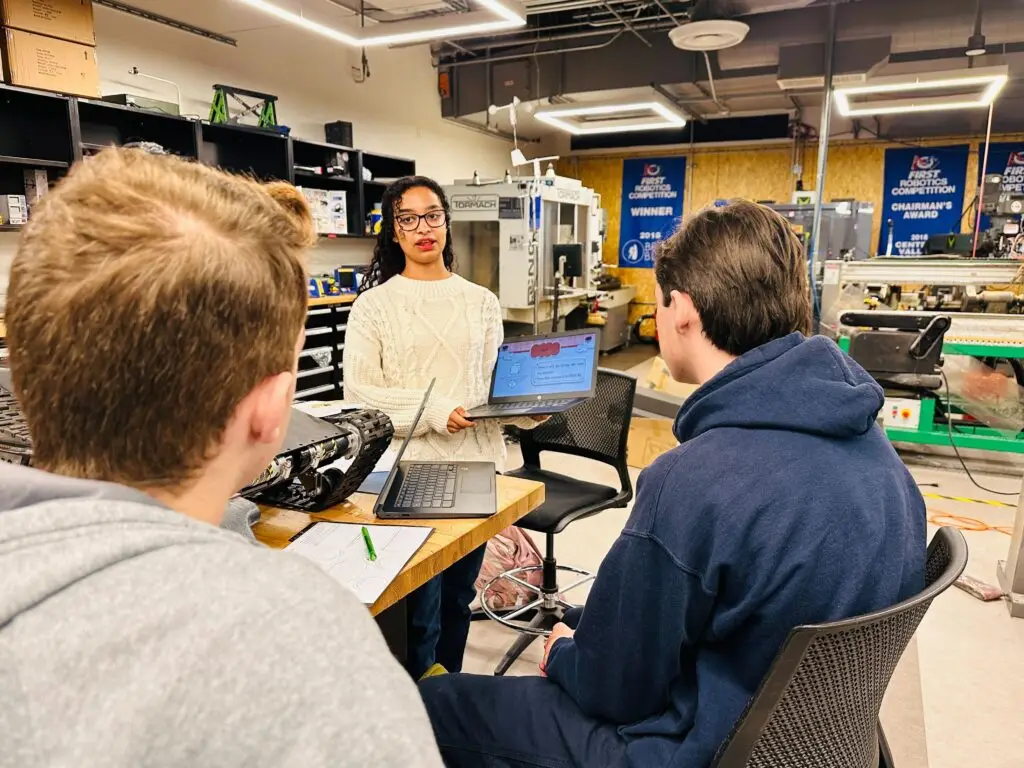AI allows us to do what would have been inconceivable just a year ago.
I had a student who loved art. She would have never considered taking a course on computer-integrated manufacturing—challenging even for engineering nerds—until she learned it could help her create a laser-cut flower. Another student passionate about music used computer-aided design and machining to build a custom guitar. A third student of mine is a veritable Edison: he’s developed a functional weather station, a sentry robot, a 3D printer with automatic tool changes, and a new camping trailer, all from scratch.
These and 256 other students are participating in Project Leo (named after Leonardo Da Vinci), which reimagines how to engage students, help them master rigorous knowledge and skills, and empower teachers. The tools are rolling out in Los Angeles’ Da Vinci Network of public charter schools. Our five small schools (all with distinct themes from science to design) have long specialized in providing mastery-based grading, project-based learning, and career technical education (CTE) for every student. As an open-source platform, Project Leo could become the public infrastructure for AI-enhanced education beyond our five schools.
AI allows us to go much broader, deeper, and faster.
With typical project-based learning, teachers would spend days figuring out a compelling project that would allow their students to apply their knowledge and skills to solve real-world problems. Because the planning process was so time-consuming and challenging, teachers tended to default to what they had seen in the past—PowerPoint presentations and poster boards.
Now, students and teachers can use an AI-enabled project generator to co-design a project that addresses their passions while teaching core learning standards. Our project builder allows students to define their interests, allows teachers or professionals to determine the skills students need to develop, and suggests other inputs like career info from O*Net, motivations from TruMotivate, XQ Competencies, and durable skills from America Succeeds. All this information passes to ChatGPT, which develops personalized projects with steps for completion.
Typical CTE made teachers decide between exposing students to careers or developing their fundamental skills. It often took too much time to do both. Now, Project Leo lets teachers of any background help their students develop skills for any career. At the same time, students can use their new skills to impact their community through career-connected projects.
Teachers used to have to grade each student’s project independently, another time-consuming bottleneck. Now, our learning management system allows student work to be viewable by anyone—fellow students, other teachers, outside professionals, and parents. All are providing feedback in ways that would have been previously impossible.
Students used to struggle to show employers or colleges what they knew and could do; a printed transcript isn’t much of a communication tool. Wealthier students would pay private companies thousands of dollars to build a project for their college applications. Now, all students (even the least advantaged) can build a portfolio of projects during the school day, and then use them to open doors.
Outside professionals used to find it challenging to mentor students. Bureaucratic red tape (fingerprinting, scheduling challenges, and the like) made it even harder. Project Leo is making it as easy to mentor and give feedback to high school students as it is to send a tweet.
To be sure, we haven’t figured everything out yet. While we have some professions covered, we need to improve the incentives for additional professionals to join our fledgling social learning platform.
Our most pressing challenge is to win the hearts and minds of teachers. The current system incentivizes teachers to maintain tight control over the learning environment, focusing on compliance and grades. But the profession piles so much on their plates that it is impossible to develop both their instructional craft and subject-matter expertise. Project Leo will help turn teachers from all-knowing experts (an impossibility) into choreographers of learning who help students create projects combining relevance and rigor.
But mindset shifts like these take time. We typically hear comments like “personalized projects just sound too overwhelming” and, “how can we guarantee that students are learning the content that they need?” The truth is that we can never guarantee students learn and retain the most important content. But Project Leo increases the probability of quality learning in every classroom, strong relationships between students and teachers, and students inspired to do hard things.
With AI’s large language models and infrastructure still being built out, the Project Leo team is playing in a rapidly changing sandbox. While we are trying to keep up with the advances in technology and implementation, we are missing many tools. Thankfully, Project Leo is our own relevant learning project that we share with students and teachers so they can continue to learn from this work.
The good news is that students are totally on board. That’s hardly a surprise, since we’re making their learning more personalized, relevant, and fun—without sacrificing rigor in any way. Now, we need to bring more adults along.
The AI revolution is just in its infancy. We’re hoping our work here inspires others to explore the new opportunities this technology offers. AI can be a game-changer, but it’s up to us educators to embrace the possibilities.




